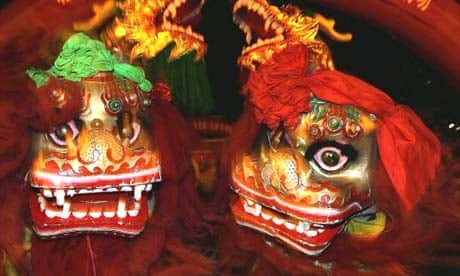Liverpool is home to one of Europe's oldest Chinese communities. At the 2007 census, its members formed the largest single ethnic minority in the city, and census figures are generally believed to underestimate the size of the population.
On Sunday 22 January, Liverpool's Chinese will hold a festival to mark the beginning of the Year of the Dragon and end of the Year of the Rabbit. The festival will also reflect the growing ties of recent years between Liverpool and Shanghai, and there will be many activities on the streets of Chinatown, including the traditional Lion, Dragon and Unicorn dances.
The Chinese connection goes back to the 1830s, when seamen began to come to work for companies such as the Blue Funnel Line. Later, many Chinese opened businesses in the city and plenty of them married local women.
The recent BBC 2 series Mixed highlighted the deportation in the mid-20th century of many Chinese men whose English wives were never informed, and lived for many years under the impression that their husbands had abandoned them. This tragedy is one of many aspects of the history of the Chinese community recalled in an exhibition in the Museum of Liverpool.
The original Chinatown was located in the dockland area, but following bombing in World War II, the community largely moved to an area west of the Anglican cathedral. In 2000, Europe's largest Chinese arch was erected here at the junction of Nelson Street and Duke Street.
Links between the community and Chine itself have strengthened in recent years with the coming of many Chinese students to the city's three universities and numerous language schools. In October 2009, the Liverpool Confucius Institute was established as a collaboration between the University of Liverpool, its partner institution Xi'an Jiaotong University and Hanban, the Chinese government agency which promotes Mandarin language learning and awareness of Chinese culture.
Events being held during the New Year festival include a tai chi demonstration, a street market, firecracker display, a VIP dinner compered by Billy Hui of BBC Radio Merseyside's Orient Express programme, a strawberry lunch at St Luke's (commonly known locally as the 'bombed-out church') and a book signing at the Black-E.
The book in question is the autobiographical East Meets West by Joan Chan, while the weekend will also see the launch of Radio Chinatown, an online station and there will be an exhibition of photos of Chinatown taken in 1984 by Magnum photographer Martin Parr.
The Chinese Community Centre on Duke Street will see performances by the Wah Sing singing and dance groups, as well as Tibetan dancing, Cantonese opera, gymnastics, karaoke and other events. Celebrations are not going to be confined to Chinatown. Elsewhere in the city, the Merseyside Chinese Community Development Association Luncheon Club will hold a party on January 17, while the Pagoda, a Chinese centre in Henry Street, will host an exhibition of calligraphy, and several other cultural events.
The Unity Theatre will have a new year celebration on February 11, as will the Liverpool Chinese Students and Scholars Association on January 31. Over the water in Birkenhead, the Wirral Chinese Luncheon Club is holding a celebration on January 25, while a number of restaurants plan events of their own. For full information on all these events, see here or here.

Comments (…)
Sign in or create your Guardian account to join the discussion